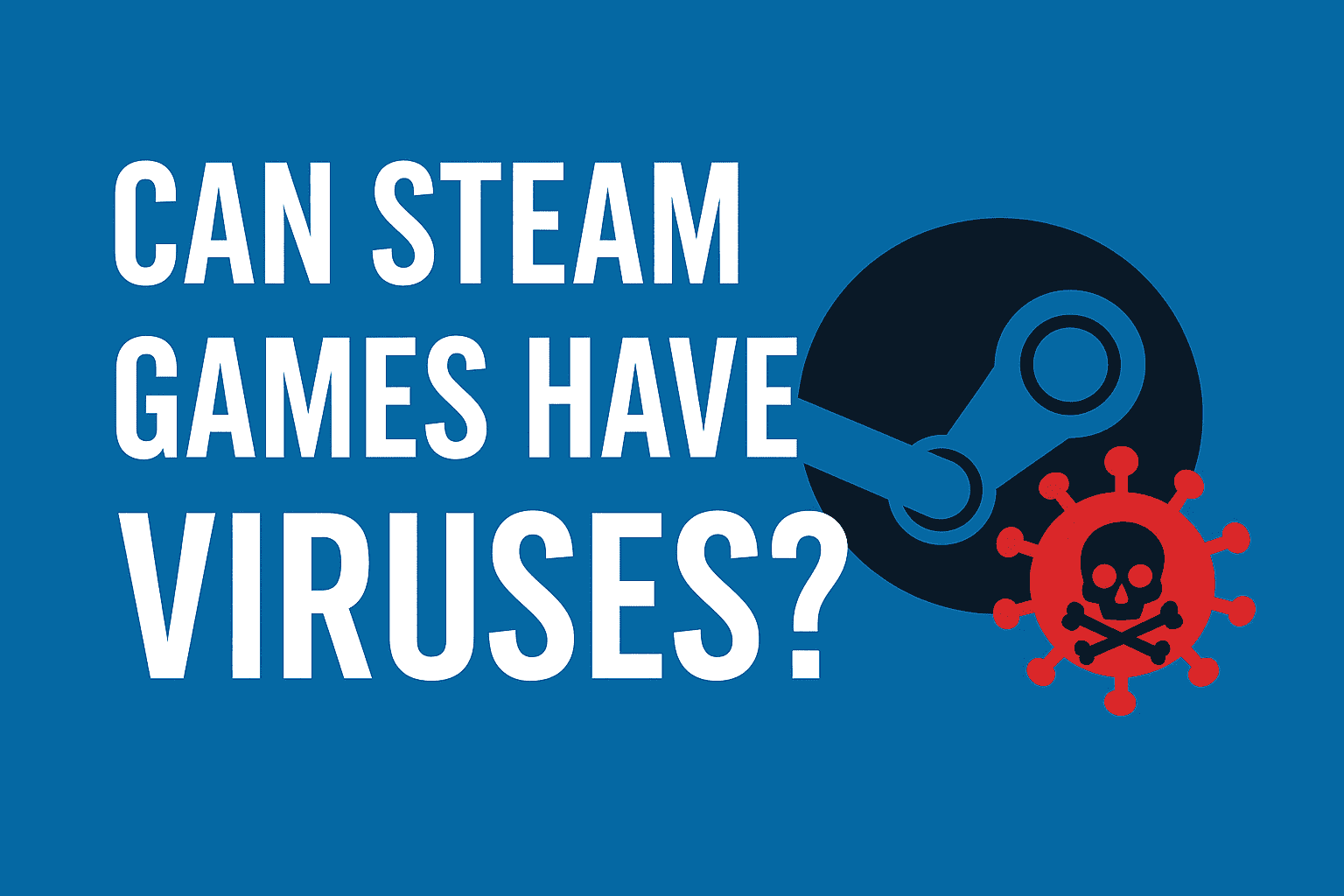Steam is one of the most popular platforms for buying and playing PC games. With over 50,000 titles available, it’s a paradise for gamers. But if you are new to Steam or simply cautious, you might ask yourself: Can Steam games have viruses?
Steam games from the official store are generally safe because Valve checks them before release. However, no platform is 100% risk-free. A game itself is unlikely to have a virus, but mods, cheats, or files from outside Steam can be dangerous. Always download games and updates directly from Steam, avoid pirated copies, and use antivirus software. If you stick to trusted sources, the chance of getting a virus from a Steam game is very low.
In this article, we will discuss “Can Steam games have viruses?”
Table of Contents
Steam is a digital distribution platform created by Valve Corporation. It allows players to:
- Buy games from trusted developers and publishers.
- Download and install them safely onto their computers.
- Update games automatically so you always have the latest version.
- Connect with friends, join multiplayer games, and use the Steam community features.
Because Steam is an official store, it is much safer than downloading pirated games or files from unknown websites.
Here’s the truth: Games bought directly from the official Steam store are usually safe. Valve scans and checks games before making them available for purchase. However, there are still a few situations where you might encounter a virus:
In rare cases, a developer could try to hide harmful code inside a game. This is uncommon because Valve removes such games when found, but it has happened in the past.
Some games allow mods (extra content created by fans). While mods from the official Steam Workshop are safe, mods downloaded from untrusted websites can contain viruses.
Scammers sometimes send fake links pretending to be Steam game downloads. Clicking these links could install malware on your PC or steal your account.
Steam uses several security systems to protect players:
- File Scanning – All games are checked for harmful files before release.
- Community Reporting – Players can report suspicious behavior or malware.
- Steam Guard – Adds extra login protection via email or the Steam Mobile App.
- Automatic Updates – Fixes security holes by updating your games regularly.
Thanks to these measures, the chance of getting a virus from a legitimate Steam game is extremely low.
Even though Steam is safe, here are practical tips to protect yourself:
- Buy only from the official Steam store – Avoid third-party key sellers that may offer unsafe downloads.
- Check reviews before downloading – Read what other players say. If you see reports of strange behavior, stay away.
- Download mods only from Steam Workshop – Mods from random sites could be risky.
- Ignore suspicious messages or friend requests – Scammers often send fake offers or game invites.
- Enable Steam Guard – Adds another layer of security to your account.
- Use antivirus software – Even if Steam is safe, your PC should still have protection.
While rare, there have been cases where malicious games slipped through:
- Abstractism (2018) – A game removed from Steam for secretly mining cryptocurrency on players’ PCs.
- ESEA Client Incident (2013) – Not a Steam game directly, but a gaming client that secretly mined Bitcoin.
These incidents remind us that no platform is 100% risk-free.
A legitimate game file itself won’t “catch” a virus like a living organism, but it can be replaced or bundled with malicious code if downloaded from unsafe sources. If someone modifies the installer or executable file, they could inject malware.
This is why downloading games from verified platforms like Steam, Epic Games, or GOG is much safer than using random file-sharing sites.
“Steam unlocked” games often refer to pirated or cracked versions that bypass Steam’s DRM. These versions are not reviewed or verified, so they carry a much higher risk of containing malware.
Hackers can easily embed trojans, keyloggers, or ransomware inside them. Unlike official Steam purchases, there’s no guarantee of safety, and antivirus software may not catch all threats before they cause damage.
In most cases, simply downloading a file doesn’t activate a virus—it usually needs to be opened or executed. However, certain vulnerabilities in browsers or operating systems can allow “drive-by downloads” that start running malware without your consent.
This is rare on modern, updated systems, but downloading suspicious files should still be avoided to minimize the risk of accidental infection.
It’s extremely rare to get a virus from Steam itself or games bought directly on the platform. Steam uses encryption, official developer verification, and a strong moderation process.
Problems usually happen when players install mods, third-party patches, or cheats from untrusted sources. Sticking to Steam’s official store and well-reviewed workshop items keeps the risk to a minimum.
Official Steam games are very unlikely to contain viruses. However, the risk increases if you download modified or cracked versions from outside Steam. Similarly, third-party add-ons, mods, or cheats could carry malware.
The safest approach is to install only from Steam’s official library or from reputable developers’ own websites, and to keep antivirus software updated.
Most games on Steam are safe thanks to Valve’s review process and developer verification. However, safety isn’t guaranteed 100%—sometimes low-quality or scammy titles slip through.
While these usually don’t contain malware, they could still be misleading or broken. Reading reviews, checking developer history, and avoiding suspicious-looking games can help ensure you only download trustworthy titles.
Steam Workshop items are usually safe, especially those from popular creators. However, because Workshop uploads come directly from users, there’s a slim chance a malicious file could be hidden inside a mod.
This is rare, but downloading only from trusted creators with good ratings and lots of subscribers reduces the risk significantly. Also, running antivirus scans regularly adds extra protection.
Yes, Steam is safe to download from its official website (store.steampowered.com). It’s one of the largest and most trusted gaming platforms in the world. The danger only arises if you download a fake or modified Steam installer from unofficial sites.
Always check that the address bar shows the correct domain before downloading to avoid phishing or malware traps.
Downloading games from legitimate stores like Steam, Epic, or PlayStation Store is safe. The risk appears when downloading from pirated, unofficial, or shady websites.
Malicious actors often disguise viruses inside game installers, cracks, or cheat tools. As a rule, stick to official sources, avoid “free cracked” downloads, and keep your security software active to prevent infections.
While Steam reviews and approves games before publishing, it is still theoretically possible for a malicious game to slip through, though this is extremely rare. Steam has strict security measures and a reputation to maintain, so most games are safe.
The main risks usually come from downloading unofficial mods, cheats, or cracked versions outside Steam, not from the official Steam store itself.
Yes – Steam is one of the safest platforms for buying and playing PC games. The risk of getting a virus from a legitimate Steam game is extremely low.
However, the danger comes when you:
- Download mods from unsafe sources
- Click on fake Steam links
- Install pirated or unofficial game files
If you follow safe gaming habits, you can enjoy Steam without worrying about viruses.
Technically, it’s very rare. Games purchased directly from the official Steam store are vetted and run through Valve’s security checks, which makes it highly unlikely they’ll contain viruses. However, if you download pirated or modified versions of Steam games from third-party sites, you could be exposed to malware.
Mods from trusted sources like Steam Workshop are generally safe, but downloading mods from unofficial websites can be risky. Malicious files can be disguised as mods, so always verify the source and scan downloaded files with antivirus software.
While no platform is 100% immune to security breaches, Steam has strong security measures like encryption, two-factor authentication, and a vetted content delivery system. Any rare security issues are usually patched quickly.
- Only download games from the official Steam store.
- Avoid cracked versions or shady key-reseller sites.
- Keep your antivirus and Steam client updated.
- Be cautious with third-party mods and files.
Immediately stop playing the game, run a full system antivirus scan, and remove any suspicious files. You can also contact Steam Support to report the game. If purchased through Steam, you may be eligible for a refund depending on your playtime and purchase date.

